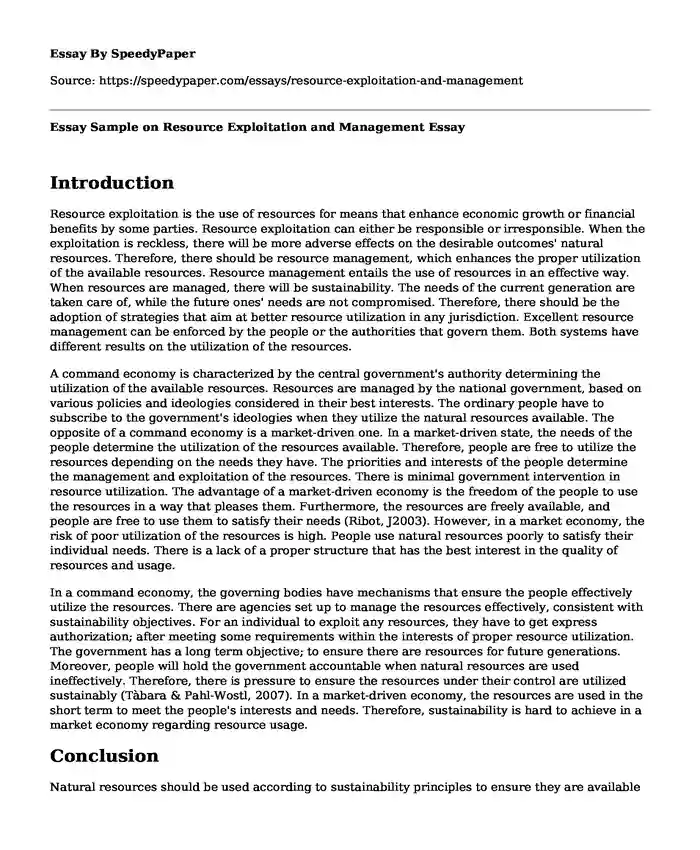
| Type of paper: | Essay |
| Categories: | Management Marketing Economics |
| Pages: | 3 |
| Wordcount: | 650 words |
Introduction
Resource exploitation is the use of resources for means that enhance economic growth or financial benefits by some parties. Resource exploitation can either be responsible or irresponsible. When the exploitation is reckless, there will be more adverse effects on the desirable outcomes' natural resources. Therefore, there should be resource management, which enhances the proper utilization of the available resources. Resource management entails the use of resources in an effective way. When resources are managed, there will be sustainability. The needs of the current generation are taken care of, while the future ones' needs are not compromised. Therefore, there should be the adoption of strategies that aim at better resource utilization in any jurisdiction. Excellent resource management can be enforced by the people or the authorities that govern them. Both systems have different results on the utilization of the resources.
A command economy is characterized by the central government's authority determining the utilization of the available resources. Resources are managed by the national government, based on various policies and ideologies considered in their best interests. The ordinary people have to subscribe to the government's ideologies when they utilize the natural resources available. The opposite of a command economy is a market-driven one. In a market-driven state, the needs of the people determine the utilization of the resources available. Therefore, people are free to utilize the resources depending on the needs they have. The priorities and interests of the people determine the management and exploitation of the resources. There is minimal government intervention in resource utilization. The advantage of a market-driven economy is the freedom of the people to use the resources in a way that pleases them. Furthermore, the resources are freely available, and people are free to use them to satisfy their needs (Ribot, J2003). However, in a market economy, the risk of poor utilization of the resources is high. People use natural resources poorly to satisfy their individual needs. There is a lack of a proper structure that has the best interest in the quality of resources and usage.
In a command economy, the governing bodies have mechanisms that ensure the people effectively utilize the resources. There are agencies set up to manage the resources effectively, consistent with sustainability objectives. For an individual to exploit any resources, they have to get express authorization; after meeting some requirements within the interests of proper resource utilization. The government has a long term objective; to ensure there are resources for future generations. Moreover, people will hold the government accountable when natural resources are used ineffectively. Therefore, there is pressure to ensure the resources under their control are utilized sustainably (Tàbara & Pahl-Wostl, 2007). In a market-driven economy, the resources are used in the short term to meet the people's interests and needs. Therefore, sustainability is hard to achieve in a market economy regarding resource usage.
Conclusion
Natural resources should be used according to sustainability principles to ensure they are available in good condition for future generations. When the resources are managed sustainably, they will be available in good condition for a longer time. However, when they are used for selfish interests, they will be deleted. In a market-driven economy, the utilization of resources is for financial gains. The gains are achieved in the short run, without considering sustainability. However, in a command economy, the resources are managed to achieve long term benefits. Therefore, it is factual to state resources are better managed in a command economy. There will be better management based on sustainability, which is better than short term financial gains.
References
Ribot, J. C. (2003). Democratic decentralization of natural resources. In Beyond Structural Adjustment The Institutional Context of African Development (pp. 159-182). Palgrave Macmillan, New York. https://link.springer.com/chapter/10.1057/9781403981288_6
Tàbara, J. D., & Pahl-Wostl, C. (2007). Sustainability learning in natural resource use and management. Ecology and society, 12(2). https://www.jstor.org/stable/26267889#metadata_info_tab_contents
Cite this page
Essay Sample on Resource Exploitation and Management. (2023, Dec 16). Retrieved from https://speedypaper.com/essays/resource-exploitation-and-management
Request Removal
If you are the original author of this essay and no longer wish to have it published on the SpeedyPaper website, please click below to request its removal:
- Child Labor Essay Samples
- Bulgaria Suffering from Deflation Essay Sample
- Free Essay: To What Extent Have the Flattening Wages Been Responsible for the Dwindling Middle Class?
- Paper Example. Samsung Diversification Type and Current Challenges as a Conglomerate
- HRM Evolves with Technological Innovation: Current Practices - Essay Sample
- Auditing in Healthcare Organizations: Essay Sample on Financial Performance and Assurance
- Essay on Navigating Peace: The 2002 US-Russia Nuclear Disarmament Treaty and its Global Implications
Popular categories




